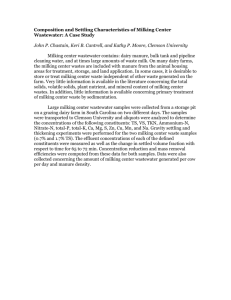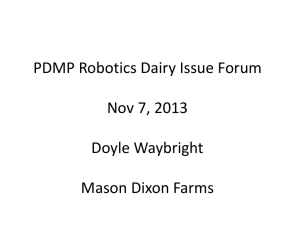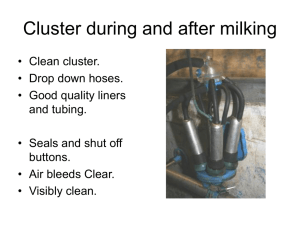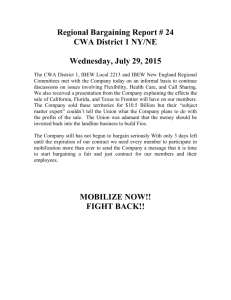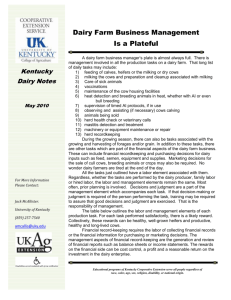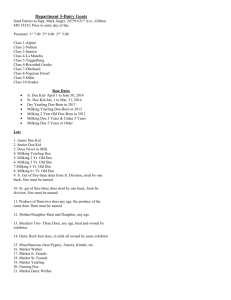President's Report March 2008
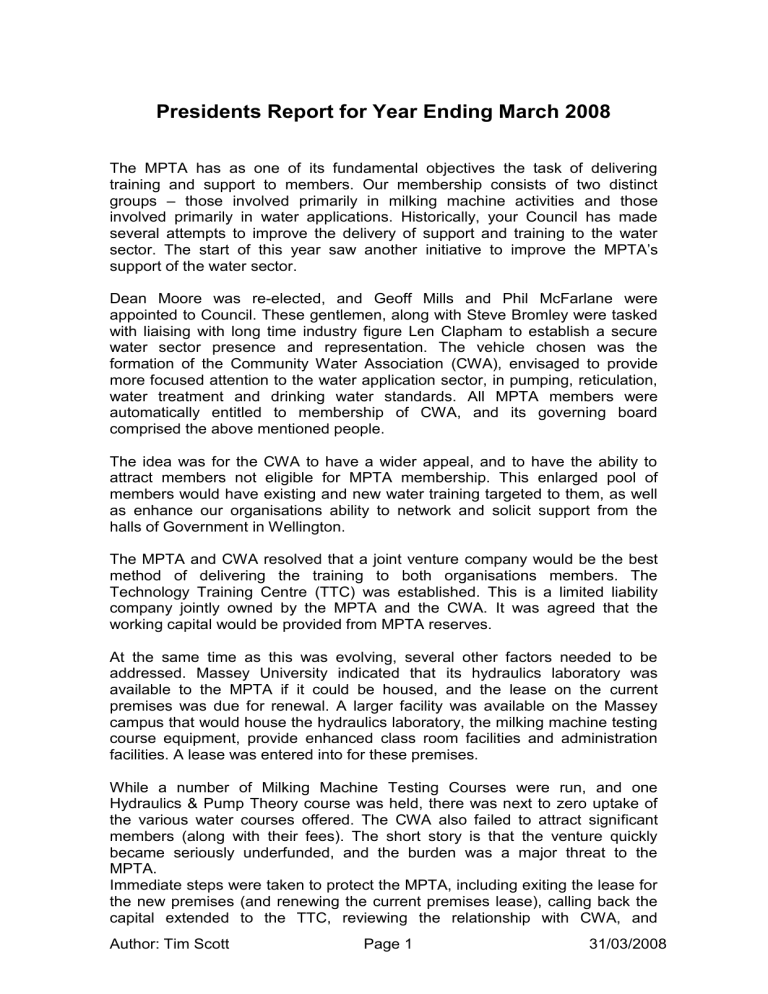
Presidents Report for Year Ending March 2008
The MPTA has as one of its fundamental objectives the task of delivering training and support to members. Our membership consists of two distinct groups – those involved primarily in milking machine activities and those involved primarily in water applications. Historically, your Council has made several attempts to improve the delivery of support and training to the water sector. The start of this year saw another initiative to improve the
MPTA’s support of the water sector.
Dean Moore was re-elected, and Geoff Mills and Phil McFarlane were appointed to Council. These gentlemen, along with Steve Bromley were tasked with liaising with long time industry figure Len Clapham to establish a secure water sector presence and representation. The vehicle chosen was the formation of the Community Water Association (CWA), envisaged to provide more focused attention to the water application sector, in pumping, reticulation, water treatment and drinking water standards. All MPTA members were automatically entitled to membership of CWA, and its governing board comprised the above mentioned people.
The idea was for the CWA to have a wider appeal, and to have the ability to attract members not eligible for MPTA membership. This enlarged pool of members would have existing and new water training targeted to them, as well as enhance our organisations ability to network and solicit support from the halls of Government in Wellington.
The MPTA and CWA resolved that a joint venture company would be the best method of delivering the training to both organisations members. The
Technology Training Centre (TTC) was established. This is a limited liability company jointly owned by the MPTA and the CWA. It was agreed that the working capital would be provided from MPTA reserves.
At the same time as this was evolving, several other factors needed to be addressed. Massey University indicated that its hydraulics laboratory was available to the MPTA if it could be housed, and the lease on the current premises was due for renewal. A larger facility was available on the Massey campus that would house the hydraulics laboratory, the milking machine testing course equipment, provide enhanced class room facilities and administration facilities. A lease was entered into for these premises.
While a number of Milking Machine Testing Courses were run, and one
Hydraulics & Pump Theory course was held, there was next to zero uptake of the various water courses offered. The CWA also failed to attract significant members (along with their fees). The short story is that the venture quickly became seriously underfunded, and the burden was a major threat to the
MPTA.
Immediate steps were taken to protect the MPTA, including exiting the lease for the new premises (and renewing the current premises lease), calling back the capital extended to the TTC, reviewing the relationship with CWA, and
Author: Tim Scott Page 1 31/03/2008
retrenching planned expenditure for new milking sector courses. The present situation is that Council considers the TTC to still be a viable option, and will continue to support it, perhaps without future partnership with CWA.
I, and your Council, firmly believe that you mandated us to take these initiatives at the last AGM, and that it was our duty to improve the delivery of training to members, both milker and water sector. It is also our duty to recognise when things aren’t going to plan and take steps to mitigate the crisis. The venture has cost the MPTA something in the order $15-20,000 dollars, and we unreservedly apologise to members for this loss. You will recall that we asked for voluntary contributions from members to enable us to proceed with the new courses and urgent course updates. Many members responded positively to this request, and to those I thank you very much.
The good news is that have reached financial stability again, and we believe we can now afford to proceed with the Milking Machine Testing Course updates.
These will cover things like testing with variable speed vacuum drives, performance tests for variable speed vacuum drives, new equipment and other procedural improvements. We also have new courses ready to roll out, including an enhanced Milk Quality Assessment course, a Milking Management course covering mastitis and stray voltage investigation, a Milk Transport & Pre-
Cooling Assessment course covering the milking system performance from the milk pump to the vat (which is not covered by the Milking Machine Test), and a not yet written Cleaning Systems Evaluation course. These courses will provide members with new service products to offer their customers, and serve as tools to help improve on farm milk quality and milking efficiency – both important goals of our organisation.
A major role of the MPTA is to network on behalf of members with other industry stake holders. In August, after some vigorous lobbying by our executive officer, the NZ Food Safety Authority finally released the new version of NZCP-
1. There is a copy available for download from the NZFSA website, and members are urged to familiarise themselves with the new document. A printed version will shortly be available. Our relationship with Fonterra continues strongly, and I thank Karl Rossiter for his continuing support of MPTA, and for his frank and open dialogues on the issues facing our industry. Sadly, we have been unable to progress the development of the NZ Certificate in Milking
Systems Engineering qualification. This is essentially the apprenticeship for new entrance technicians, but the barriers facing us are huge, with large self interest organisations like ITO’s and Polytechs considering our target student numbers too low, and our funding sources too limited. This task will be passed to the TTC management to continue nibbling away at.
If I may, I would like to offer some criticism of members. Your Council are all volunteers, heavily involved in their own businesses, as all our members are, but we are dismayed by the complete apathy of members when it comes to participating in their industry. We wonder if our work is being appreciated, and whether the MPTA should continue to serve the industry. Members must get more involved in the affairs of the MPTA, make them selves available for nomination to Council, attend training courses and conferences etc. It is YOUR organisation, working for the betterment of YOUR businesses, now and into the
Author: Tim Scott Page 2 31/03/2008
future. Please take some notice of this criticism. Having said that, it is pleasing to note there is a steady stream of new members, and a growing Registered
Milking Machine Tester list. This is proof that members do see some value in the services provided by the MPTA.
During the year, long time councillor Ian Gunn tendered his resignation from
Council as he has taken an overseas appointment with his company. I would like to thank Ian for his service and commitment over the years, particularly for his input to the Technical Committee, as our representative on the National
Mastitis Council, and for his work on developing training for new entrant technicians. I would like to thank all councillors and our executive officer for their input during what has been a most difficult year. I am sure that we enter the next year in a much more robust position, and that we can focus on the core tasks of delivering training and support to members.
Tim Scott
President
MPTA COUNCIL MEMBERS TO DATE.
OEM MEMBERS.
Mr. Craig Burrows, Dairymaster N.Z. Ltd. Stratford.
Mr. Barry Miller, Skellerup Industries Ltd. New Plymouth.
Mr. Neil McIntyre, Ideal Milking Machine Co Palmerston North
Dealer Members
Mr. Tim Scott, Anderson & Rooney Ltd Temuka
Mr. Steve Bromley Waikato Milking Systems Palmerston North
As per MPTA rules and constitution further Council members will be appointed at next Council meeting.
MPTA SUBSCRIPTIONS
Subscriptions set at the AGM.
ALL MEMBERS, $325.00 Plus GST>
Author: Tim Scott Page 3 31/03/2008
